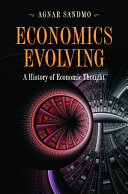

Most ebook files are in PDF format, so you can easily read them using various software such as Foxit Reader or directly on the Google Chrome browser.
Some ebook files are released by publishers in other formats such as .awz, .mobi, .epub, .fb2, etc. You may need to install specific software to read these formats on mobile/PC, such as Calibre.
Please read the tutorial at this link: https://ebookbell.com/faq
We offer FREE conversion to the popular formats you request; however, this may take some time. Therefore, right after payment, please email us, and we will try to provide the service as quickly as possible.
For some exceptional file formats or broken links (if any), please refrain from opening any disputes. Instead, email us first, and we will try to assist within a maximum of 6 hours.
EbookBell Team

0.0
0 reviewsIn clear, nontechnical language, this introductory textbook describes the history of economic thought, focusing on the development of economic theory from Adam Smith's Wealth of Nations to the late twentieth century.
The text concentrates on the most important figures in the history of economics, from Smith, Thomas Robert Malthus, David Ricardo, John Stuart Mill, and Karl Marx in the classical period to John Maynard Keynes and the leading economists of the postwar era, such as John Hicks, Milton Friedman, and Paul Samuelson. It describes the development of theories concerning prices and markets, money and the price level, population and capital accumulation, and the choice between socialism and the market economy. The book examines how important economists have reflected on the sometimes conflicting goals of efficient resource use and socially acceptable income distribution. It also provides sketches of the lives and times of the major economists.
Economics Evolving repeatedly shows how apparently simple ideas that are now taken for granted were at one time at the cutting edge of economics research. For example, the demand curve that today's students probably get to know during their first economics lecture was originally drawn by one of the most innovative theorists in the history of the subject. The book demonstrates not only how the study of economics has progressed over the course of its history, but also that it is still a developing science.